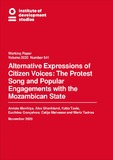Alternative Expressions of Citizen Voices: The Protest Song and Popular Engagements with the Mozambican State
| dc.contributor.author | Manhiça, Anésio | |
| dc.contributor.author | Shankland, Alex | |
| dc.contributor.author | Taela, Kátia | |
| dc.contributor.author | Gonçalves, Euclides | |
| dc.contributor.author | Maivasse, Catija | |
| dc.contributor.author | Tadros, Mariz | |
| dc.coverage.spatial | Mozambique | en |
| dc.date.accessioned | 2020-11-02T15:22:47Z | |
| dc.date.available | 2020-11-02T15:22:47Z | |
| dc.date.issued | 2020-11-02 | |
| dc.identifier.citation | Manhiça, A.; Shankland, A.; Taela, K.; Gonçalves, E.; Maivasse, C. and Tadros, M. (2020) Alternative Expressions of Citizen Voices: The Protest Song and Popular Engagements with the Mozambican State, IDS Working Paper 541, Brighton: Institute of Development Studies | en |
| dc.identifier.isbn | 978-1-78118-712-8 | |
| dc.identifier.issn | 2040-0209 | |
| dc.identifier.uri | https://opendocs.ids.ac.uk/opendocs/handle/20.500.12413/15751 | |
| dc.description.abstract | This study examines Mozambican popular music to investigate three questions: Are notions of empowerment and accountability present in popular music in Mozambique? If so, what can these existing notions of empowerment and accountability reveal about relations between citizens and state institutions in general and about citizen-led social and political action in particular? In what ways is popular music used to support citizen mobilisation in Mozambique? The discussion is based on an analysis of 46 protest songs, interviews with musicians, music producers and event promoters as well as field interviews and observations among audiences at selected popular music concerts and public workshops in Maputo city. Secondary data were drawn from radio broadcasts, digital media, and social networks. The songs analysed were widely played in the past two decades (1998–2018), a period in which three different presidents led the country. Our focus is on the protest song, conceived as those musical products that are concerned with public affairs, particularly public policy and how it affects citizens’ social, political and economic life, and the relationship between citizens and the state. | en |
| dc.description.sponsorship | Foreign, Commonwealth & Development Office | en |
| dc.language.iso | en | en |
| dc.publisher | Institute of Development Studies | en |
| dc.relation.ispartofseries | IDS Working Paper;541 | |
| dc.rights | This is an Open Access paper distributed under the terms of the Creative Commons Attribution 4.0 International licence (CC BY), which permits unrestricted use, distribution, and reproduction in any medium, provided the original authors and source are credited and any modifications or adaptations are indicated. | en |
| dc.rights.uri | http://creativecommons.org/licenses/by/4.0/ | en |
| dc.subject | Governance | en |
| dc.subject | Politics and Power | en |
| dc.title | Alternative Expressions of Citizen Voices: The Protest Song and Popular Engagements with the Mozambican State | en |
| dc.type | IDS Working Paper | en |
| dc.rights.holder | Institute of Development Studies and Kaleidoscopio – Research in Public Policy and Culture 2020 | en |
| dc.identifier.team | Power and Popular Politics | en |
| dc.identifier.doi | 10.19088/IDS.2020.001 | |
| rioxxterms.funder | Default funder | en |
| rioxxterms.identifier.project | Default project | en |
| rioxxterms.version | VoR | en |
| rioxxterms.funder.project | 9ce4e4dc-26e9-4d78-96e9-15e4dcac0642 | en |
Files in this item
This item appears in the following Collection(s)
Except where otherwise noted, this item's license is described as This is an Open Access paper distributed under the terms of the Creative Commons Attribution 4.0 International licence (CC BY), which permits unrestricted use, distribution, and reproduction in any medium, provided the original authors and source are credited and any modifications or adaptations are indicated.


